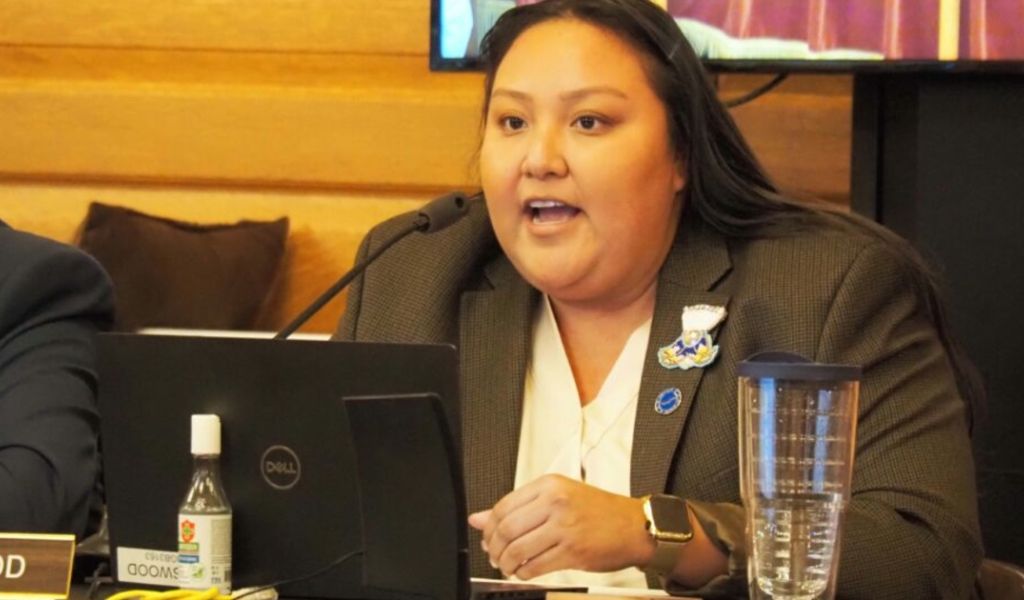More rules for custody disputes involving Native American children, according to Representative Christina Haswood, may improve the state’s child welfare system’s results. (The Kansas Reflector/Rachel Mipro)
TOPEKA: Rep. Christina Haswood, a Democrat from Lawrence and a member of the Navajo Nation, is working to lessen disparity in the state’s child welfare system by securing indigenous rights. The system has long been plagued by racial and cultural inequities.
Her endeavour is to execute a state-specific adaptation of the Indian Child Welfare Act. The goal of the 1978 federal statute is to maintain Native American children living with their family.
The removal of Native American children from their families and placement in non-indigenous homes prompted the federal act to be passed. Native children continue to be overrepresented in foster care and frequently spend lengthy periods of time there both locally and nationally.
The health administration of President Joe Biden has suggested a rule change at the federal level that would force states to submit additional information in child welfare cases pertaining to the Indian Child Welfare Act.
H aswood is requesting guidelines for Native American child custody cases. House Bill 2772 would mandate that courts seek to place a Native American child with their tribe and grant the child’s Indian tribe jurisdiction over proceedings.
According to Haswood, there are 17 states with state-specific ICWAs, including Oklahoma, Colorado, and Nebraska. The federal ICWA was a reaction to historical injustices, including the federal government’s persistent effort to take native children from their homes and force them into white adoptive families and boarding schools in order to integrate them into mainstream white culture.
Additional safeguards are sought after by state versions of the act, particularly in the wake of judicial challenges to the federal statute.
During a bill hearing on February 19, Haswood stated, “HB2772’s purpose is not to change much but to make sure ICWA has a home in our state statutes.”
According to Haswood, “We want to make sure every native child who is in these terrible situations knows there is a system that is fighting for their right to culture and heritage.”
Other provisions of the measure, which drew inspiration from Nebraska’s ICWA, would mandate that state courts establish guidelines for any cases pertaining to Indian children. Notification of the proceedings would also have to be given by the state courts.
According to a 2021 state audit of foster care cases, Native American children had a 25% lower chance of reunifying with their parents and a higher likelihood of transferring to a different agency compared to their white counterparts. Compared to white foster children, Native American and Black children in Kansas had a higher chance of reaching emancipation age.
The Kansas Department for Children and Families stressed the state’s support of indigenous connections while maintaining a neutral stance on HB 2772.
According to official testimony, “DCF recognises the continuing and compelling governmental interest of sovereign tribal nations in their children.” “The department supports the federal policy that underpins the Indian Child Welfare Act (ICWA), which aims to prevent the arbitrary and needless removal of Indian children from their families and tribes while also protecting the best interests of Indian children and promoting the stability and security of Indian tribes and Indian families.”
A number of solicitors expressed disagreement with the Act, requesting additional time and consideration to be given to the issue. A uniform state ICWA is already being worked on, according to Scott Nehrbass, a partner at the Foulston Siefkin law firm and a member of the Cherokee Nation.
Nehrbass stated, “Kansas shouldn’t take a risk and abandon these efforts.” “Before adding a Kansas state law to the federal ICWA statute and regulations that already occupy this field, let the legal experts do their work and come up with a well-considered and thoroughly vetted piece of uniform legislation for our legislators to adopt.” In order to prevent ambiguity in the law, we must avoid conflicts with the current federal ICWA Act, regulations, and case law.

